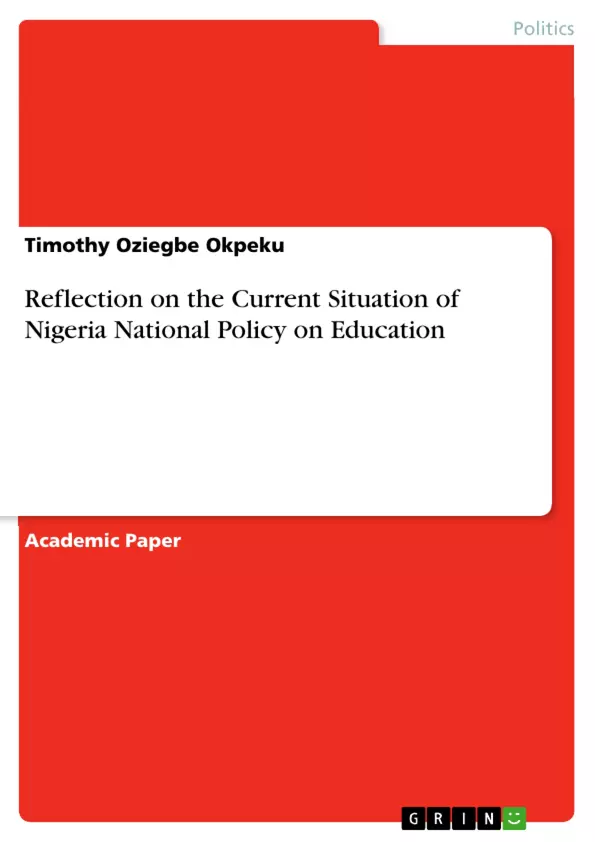The paper reflects on the current situation of Nigeria's national policy on education and the case study of the basic and post-basic education. The paper goes through the challenges and way forward for the basic and post-basic education in Nigeria, as well as areas to be strengthened regarding the national policy on education. The paper suggests possible approaches to the education policy in Nigeria. Based on the conclusion of this paper, the gap and way forward for the education policy were therefore highlighted.
Table of Contents
- Introduction
- Basic Education
- Post-Basic Education
- Current States of the Nigeria National Policy on Education
Objectives and Key Themes
This paper examines the current state of Nigeria's national policy on education, focusing specifically on basic and post-basic education. It explores the challenges facing this sector and proposes potential solutions for strengthening the policy and improving educational outcomes.
- Challenges and constraints in implementing the education policy
- The importance of basic and post-basic education for national development
- The role of government, stakeholders, and individuals in education reform
- The impact of the global economy on education in Nigeria
- The need for innovation and resource allocation to improve education quality
Chapter Summaries
- Introduction: The paper introduces the significance of education in shaping individuals and nations, providing context for the subsequent discussion on the national policy on education in Nigeria. It highlights the historical development of the policy and its various amendments.
- Basic Education: This section focuses on the compulsory 9-year basic education in Nigeria, outlining its structure, objectives, and challenges. It discusses the Universal Basic Education (UBE) Act and its implementation, highlighting the role of the federal government, private institutions, and the challenges faced in providing quality education.
- Post-Basic Education: This section focuses on the 3-year senior secondary education in Nigeria, outlining its objectives, structure, and the role of different stakeholders. It discusses the importance of post-basic education in enhancing basic knowledge and promoting economic competitiveness.
Keywords
The paper examines the state of education in Nigeria, with keywords such as reflection, national, policy, basic, post-basic, education, challenges, constraints, implementation, development, innovation, stakeholders, and global economy. It explores the need for reforms and solutions to improve the quality and accessibility of education for all citizens.
Frequently Asked Questions
What is the focus of Nigeria's National Policy on Education?
The policy focuses on providing a framework for the education system, specifically addressing basic education (9 years) and post-basic education (3 years).
What is the "UBE Act" in Nigeria?
The Universal Basic Education (UBE) Act mandates a compulsory 9-year basic education to ensure all children acquire fundamental knowledge and skills.
What are the main challenges in Nigeria's education system?
Challenges include inadequate resource allocation, constraints in policy implementation, and the need for better quality control in both public and private institutions.
How long is post-basic education in Nigeria?
Post-basic education, which follows basic education, typically lasts for 3 years at the senior secondary level.
Why is education reform important for Nigeria's development?
Education is seen as the key to national development and economic competitiveness in the global market.
What role do private institutions play in Nigeria's education?
Private institutions complement the federal government's efforts in providing educational access, though they also face challenges in maintaining standards.
- Quote paper
- Dr. Timothy Oziegbe Okpeku (Author), 2023, Reflection on the Current Situation of Nigeria National Policy on Education, Munich, GRIN Verlag, https://www.grin.com/document/1363565



